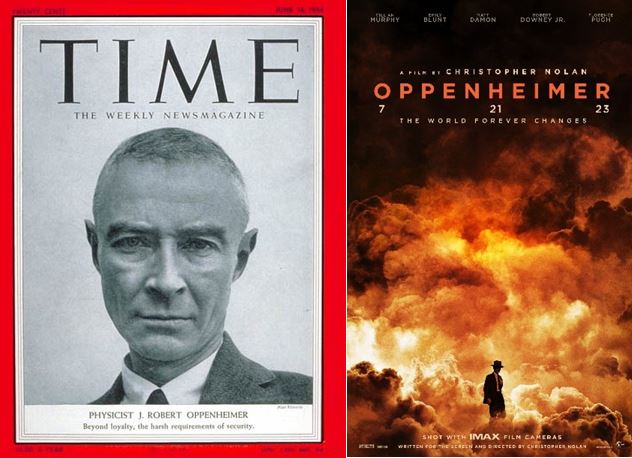
Forget about Aliens, Nightmare on Elm Street, the Omen, the Texas Chainsaw Massacre, Friday the 13th and Jaws.
No, by far the scariest monster movie that we have ever seen is Christopher Nolan’s, Oppenheimer.
The Frankenstein that the Los Alamos scientists cobbled together from mostly purified uranium and unleashed in the film and in real life on July 16, 1945, is the atomic bomb. In the movie, the awesome power of the monster is first seen not heard. In the aftermath of the detonation of Trinity, Oppenheimer’s chosen name for the monster, we watch onscreen as a churning nuclear fireball climbs slowly and silently skyward for a good 30 seconds, maybe more, gathering force and energy and momentum for the ensuing sound blast/shockwave. The sudden eruption of high-decibel sound after that initial eerie silence made us jump like in a horror movie and spill our popcorn.
And scare us it should. Even terrify.
Today 9 countries are nuclear-armed. These are China, North Korea, France, India, Israel, Pakistan, Russia, the United Kingdom, and the United States. Only the specter of mutually assured destruction (MAD) has so far prevented their use after World War II. However, Russia’s use of nuclear threats during the Ukraine conflict, North Korea’s continued development of nuclear warheads and intercontinental ballistic missiles (ICBMs), and Iran’s suspected quest for nuclear status suggest that the nuclear taboo is much more fragile than it has ever been.
Outside of the immediate blast radius, the main danger of nuclear detonation is the radioactive fallout that travels on wind currents to blanket the Earth with radioactive material hundreds of miles away. Exposure to fallout is responsible for radiation poisoning or acute radiation syndrome (ARS), elevated cancer rates, birth defects, and death.
Short of worldwide nuclear disarmament, which is unlikely to ever happen, a potential countermeasure against the radioactive fallout is the use of a radioprotector. A radioprotector is a compound that prevents or reduces radiation damage through, for example, scavenging of free radicals and reduction of inflammation.
To date, no radioprotectors are approved. However, the EpicentRx lead molecule, nibrozetone (RRx-001), is under development as a radioprotector for head and neck cancer patients that receive chemotherapy and radiation. In several animal experiments, funded in part by a sizable Armed Forces Radiobiology Research Institute (AFRRI) grant, nibrozetone (RRx-001) increased the survival of animals exposed to lethal doses of radiation; these results led to FDA orphan designation for ARS or radiation poisoning with nibrozetone. For more information, click here to this EpicentRx write-up entitled The Case for RRx-001 as a Radiation Countermeasure.
The dialectical question that looms large over the movie is whether mutual deterrence and rational self-preservation will continue to hold the peace, or whether the baser instincts of humanity will win out and inevitably lead to nuclear war? The movie never directly picks a side or takes a position much like its subject, Oppenheimer, who was massively conflicted and ambivalent about the existence of the weapons that he helped to create. The same is true of the book on which the movie, Oppenheimer, is based called “American Prometheus”. The book title is apt because Prometheus, like Oppenheimer, stole fire from the gods (atomic fire in Oppenheimer’s case) to give to humanity, and, in return, Prometheus, like Oppenheimer, was harshly punished for it.
It is this political, cultural, and moral uncertainty at the center of Oppenheimer, the movie, that makes it at once so thought-provoking and terrifying and, therefore, from our perspective well worth the watch. This is despite several drawbacks including an overcomplicated plot and very poor enunciation from actors like Robert Downey Jr., who tended to mumble, all of which made the movie hard to follow and even harder to hear.
Since nuclear weapons are not likely to be eliminated anytime soon, hopefully Oppenheimer will motivate governments to focus on the development of radioprotectors like RRx-001 that would prevent/mitigate the damage from radioactive fallout should the worst ever come to pass.
